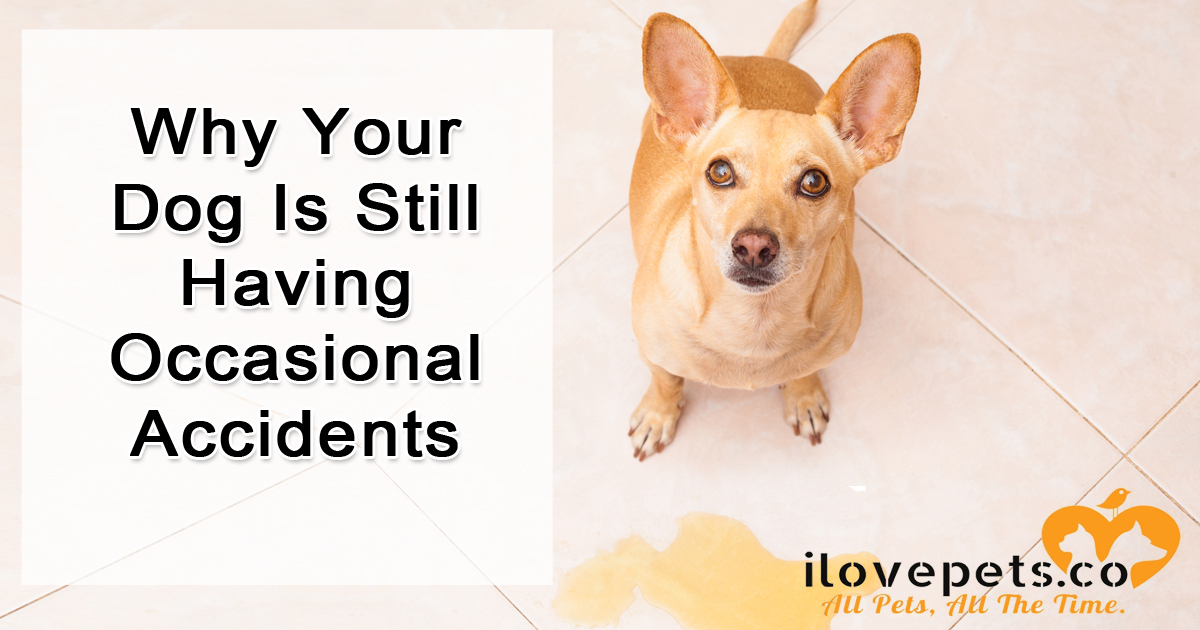
After weeks of supervision, praise and dozens of walks, you’re proud to say that your dog is almost fully potty trained. They still have occasional accidents. There’s usually a pattern to it.
You can break the pattern of occasional accidents by re-training your dog to alert you to take them out when they’re most likely to make a mistake.
What to do when your dog is completely potty trained except:
…at other people’s houses
Nothing could be more embarrassing than watching your puppy have an accident at a friend’s house. Dogs sometimes seem to forget their house manners when they’re someplace new. Our first instinct is to avoid bringing the dog for visits anymore, but it doesn’t have to be that way.
This is a common problem, and it’s often because the puppy has not generalized their potty skills for different locations. They might know the difference between “inside” and “outside” at your house, but may not realize that your friend’s floor is off-limits for pottying too. Your friend might also have pets who have had accidents in their home. The lingering scent could attract your puppy into having an accident to leave a scent of their own.
When you’re in a new place, act as though your dog has never been house-trained before. Keep them on a leash and take them out every few minutes until they relieve themselves in an appropriate spot outside.
Keep taking your dog to new places. Visits should be short. It’s tough to keep track of your puppy and do what you normally would when you visit your friends. A leash or crate can keep your puppy from sneaking off to pee while you’re distracted.
…at night
Your puppy is great at holding their bladder and bowels during the day, but you’re still waking up to accidents.
By a year old, you can expect your puppy to be able to sleep through the night. Before your dog is a year old, especially if they are a small breed puppy, this might be too big of expectation.
You can reduce the chances that your puppy will have an accident at night by taking away their water 2 hours before bedtime. Take puppy out one last time immediately before bed. Feeding earlier could help if they’re pooping in the house.
If you crate your puppy overnight, you won’t have to worry as much about an accident. Dogs typically do not soil their beds because they do not like sitting in their own waste. However, crating can be very stressful for puppies. You will need to introduce your puppy to the crate gradually and keep them close to you, rather than in a different room where you cannot hear them whine.
Letting your dog “cry it out” causes separation anxiety. It teaches your dog that they cannot rely on you to help them if they are in distress. Puppies that are left alone to cry may stop barking, but express their fears by chewing on their paws or ripping up bedding.
You can also sleep with your puppy to keep them from having accidents. If you’re a light sleeper, you can wake up when your dog stirs, take them for a quick potty trip, then go back to bed.
…when you come home
If your dog is perfectly housetrained with no accidents, but pees on the floor when you arrive home. This is involuntary, so scolding your dog would be ineffective. Your dog might be peeing because they have not been let out in hours, and the excitement of your arrival makes it impossible for your dog to hold it a second longer.
In this case, you would need to make your arrival as boring as possible. Take your dog outside right away instead of greeting them. Remind family members to avoid greeting the dog in a big, happy voice or reaching down to pet them until they have settled in.
Some dogs may pee when they are timid or fearful. You can help your dog become more confident by taking care not to raise your voice or punish them during training. Positive-reinforcement centered games and training help build your relationship and make your dog more confident.
…when there’s no potty pad
Potty pads prevent accidents when it’s not possible for you to take your dog outside often enough. They’re great for apartments and those who don’t have fenced in yards. However, they get your puppy in the habit of looking for a spot to relieve themselves instead of letting you know when they need to go.
Only remove the potty pads when you can supervise your puppy. When they start walking towards the usual pad location, take them outside. You can use potty bells to teach your puppy to alert you instead of looking for an alternative spot.
…when they can’t get your attention
Your dog meekly scratches at the door when they have to go out, but you often don’t hear them.
You can teach your dog a more noticeable way to alert you when they need to relieve themselves.
First, you’ll need to train your dog to alert. You can teach your puppy to ring bells, touch your hand with their nose, spin or bark. Ask your dog to alert every time you take them outside. Pretty soon, they’ll start automatically alerting you when they have to go out.
…when it’s cold outside
Your dog might refuse to go outside when it’s too cold, waiting to relieve themselves until they can hold it no longer.
You’ll need to make sure your dog is warm enough to comfortably do their business in the cold. A sweater, a coat and boots will help. Until your dog learns to go potty outside in the cold, you’ll need to walk them out with a leash and praise them lavishly when they finally go.
Your dog can learn that the sooner they do their business, the sooner they’ll get to go inside.
LEAVE A COMMENT below to share your thoughts and experiences. We would love to hear from you!
Don’t forget to SHARE this article on your favorite social media outlets:






